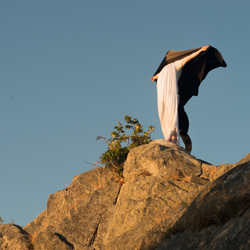The Edge: Stick Puppets, Free Cookies, But No Plot

An amalgam of stick puppetry, spoken word poetry, beat boxing, monologue and slightly absurdist dialogue, this entire show felt like a non sequitur.
I’m not sure I would call this a play. It feels more like a performance piece. There isn’t a plot. There are no clear characters. There’s a male stick puppet and a female stick puppet, but who they are or what they want is not obvious. Near the end of the show we’re all given chocolate chip cookies (which I was confused by but grateful for as frankly my sugar levels needed a boost by that point in the show). I wait for a story, but one never emerged.
Directed and written by Martin Schobel along with Sha-nnon Hart and Sidartha Murjani, and presented by the Unlikely Heroes Collective, The Edge is not a show I would recommend if you like your theatre to have a clear conflict, well-delineated and complex characters, and a storyline that you can follow from start to finish.
However if you enjoy unusual staging and general confusion, then you’ll enjoy this show. The staging was admittedly interesting, though bizarre. For about a quarter of the play we watched as a stick puppet show played out inside a five-foot by five-foot cube. The puppet show was illuminated only by a flashlight inside the cube; the rest of the stage was in pitch black darkness. Off stage two actors read a dialogue into microphones that cast the sound over our heads while we watched two stick puppets move up and down.
The last line of the show was “I am enough.” And it seemed like that is what the creators were trying to share with us throughout the performance - that we are all enough, just as we are. Unfortunately for such a vulnerable (and important!) message, there was little vulnerability on stage. I don’t feel like the performers really let their guards down and let themselves be seen. Near the end Schobel stood on top of the cube with his arms wide open for what seemed like at least five minutes. And yet, despite this open hearted physical stance, it didn’t feel like we were being let in.
You know when a baby looks you in the eye and you can see straight through them. There’s no guile. They’re not hiding anything. They are simply who they are, which is generally why we all smile so much when around babies. Being in the presence of true vulnerability is humbling and beautiful and rare.
This experience was missing from The Edge. A show which proclaims, in its write-up, that it will take us into the desert of a person’s soul, must give us more than tricky staging and absurdist dialogues, it must reveal something deep and true and real.



